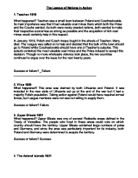Mussolini was so encouraged by the lack of effective League action during the Manchurian Crisis that, from 1932, he began detailed planning for the conquest of Abyssinia. In October 1935, Italy invaded Abyssinia. The League, now supported by Britain and France, began to take a tougher line. . The League condemned Italy and introduced economic sanctions which, however did not include a ban on exports of coal, oil and steel to Italy. (These are vital to modern warfare.) So half-hearted were the sanctions that Italy was able to complete the conquest of Abyssinia by May 1936. A few weeks later sanctions were abandoned and Mussolini had flouted the League. Britain and France had not wanted to antagonise Mussolini and had even tried to form a secret deal with him during the invasion to give him two thirds of Abyssinia. They did not want to push him into an alliance with Hitler. Mussolini was annoyed by the sanctions anyway and began to draw closer to Hitler; small states lost faith in the League; and Hitler himself was encouraged to break the Versailles Treaty. After 1935, the League was not taken seriously again.
In March 1936, they decided to ban the sale of oil and petrol to Italy. However, this did not fully come into effect until May 1936. In July 1936, all sanctions against Italy were ended. The League of Nations was broken by the Abyssinian crisis.
Another argument supported by Historian James Joll is that the league had a lot of challenges in the 1930’s due to the Wall Street Crash and the attitudes of the member nations that made it difficult for them to take proper decisions.
When the Wall Street Crash happened in the USA in October 1929 it soon began what became known as the Great Depression. This was a serious economic crisis which affected almost the entire world, and led to widespread unemployment and social suffering. It also contributed to the emergence of extreme political parties in many countries. Italy had already become a Fascist dictatorship before 1929, but both Japan and Germany came under the control of extreme nationalist and dictatorial governments during the early 1930s. Yet all three countries at first remained members of the League. These governments increasingly turned to aggressive foreign policies in an attempt to solve their economic problems at the expense of other countries. At the same time, other countries tended to put their own economic interests first -even if they were members of the League. This meant many were reluctant to impose economic sanctions on an aggressive country in case they lost trade to their foreign competitors.
The response of the USA in this period was to become even more isolationist than it had been in the 1920s. This trend continued under Roosevelt, whose main concern was to push through his New Deal policies. Some American politicians even said that the USA should remain neutral if another war broke out in Europe. One result of this was that Britain and France, both of which also suffered from the Depression, were reluctant to risk any conflict, in case they had to fight on their own. The one other non-member country which could have strengthened the League of Nations ability to curb aggressive actions, was the Soviet Union. But Britain and France did not trust its Communist government, even after Stalin successfully applied for membership of the League in 1934.
The Manchurian Crisis occurred during 1931-1932, when the Depression was at its peak. European countries and the USA were thus more concerned with the problems created by the Depression. The USA had much trade with Japan, and was reluctant to get involved in the conflict between China and Japan. Despite growing disagreements with Japan, the USA refused to consider the idea of economic sanctions. As a result, most League members feared any trade ban imposed on Japan would merely result in losing that trade to the USA. In addition to trade concerns, Britain was worried that a conflict with Japan might endanger British colonies in Asia, such as India. France was more concerned about German intentions. Italy due to the effects of the Depression was already planning to increase its own empire.
The World Disarmament Conference, organised by the League, failed to agree limits on weapons. It was attended by 61 member nations, and 5 non-members, including both the USA and the USSR. France again unsuccessfully attempted to give the League its own army. The main problem, however, was over disarmament and Germany's insistence on equality of treatment. In 1932, German delegates walked out of the Conference, and said they would not return until they had been granted equality of treatment. After Hitler became Chancellor of Germany in January 1933, Germany left the Conference for good. In October, Hitler took Germany out of the League. By this stage, all the powers knew that Hitler was secretly rearming Germany already. They also began to rebuild their own armaments; in part, it was seen as a way of reducing unemployment and stopping industrial decline. Against that background the Disarmament Conference struggled on for another year but in an atmosphere of increasing futility. It finally ended in 1934.
Therefore it can be concluded that the League of Nations had to face a lot of challenges in the 1930’s but its main role was to overcome these challenges and resolve issues. The League was not able to keep up with the international pressure it was surrounded by which led to it’s intimidate failure.







